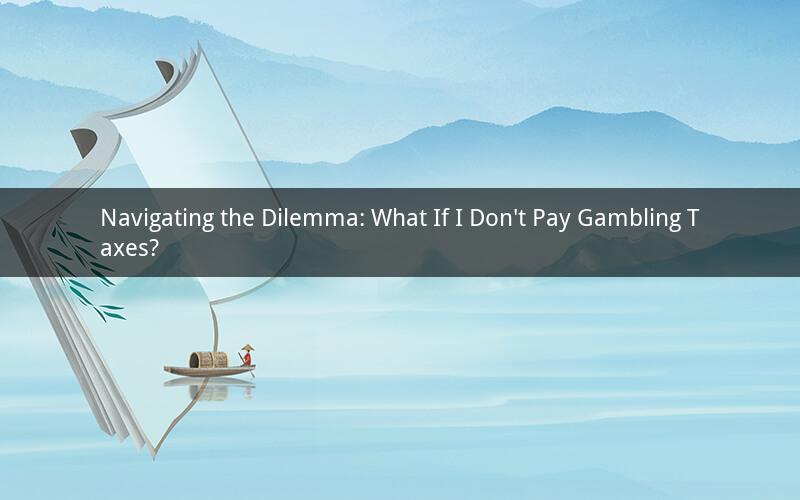
Introduction:
Gambling has always been a topic of interest for many individuals around the world. While it can be an enjoyable pastime, it also comes with its own set of legal and financial responsibilities. One of the most crucial aspects of gambling is paying taxes on the winnings. However, what if you find yourself in a situation where you don't pay gambling taxes? This article delves into the potential consequences and the importance of fulfilling your tax obligations.
1. The Legal Implications of Not Paying Gambling Taxes:
When you win money through gambling, it is considered taxable income in many countries. Failure to pay these taxes can lead to severe legal consequences. Here are some of the potential implications:
a. Audits and Investigations: Tax authorities often conduct audits to ensure that individuals are compliant with tax laws. If they discover that you haven't paid gambling taxes, you may face an investigation, which can be time-consuming and stressful.
b. Penalties and Fines: Non-compliance with tax laws can result in penalties and fines. The amount of the penalty depends on various factors, including the amount of tax owed and the duration of the non-compliance.
c. Legal Actions: In extreme cases, failing to pay gambling taxes can lead to legal actions, such as liens on your property or even criminal charges. This can have long-term consequences for your financial stability and reputation.
2. The Importance of Paying Gambling Taxes:
Paying gambling taxes is not only a legal requirement but also an ethical responsibility. Here's why it's important:
a. Funding Public Services: Tax revenues generated from gambling contribute to the funding of public services, such as healthcare, education, and infrastructure. By paying your taxes, you are contributing to the betterment of society.
b. Fairness: When individuals evade taxes, it creates an uneven playing field. Paying your fair share ensures that everyone is contributing to the same system and helps maintain a level playing field for all taxpayers.
c. Transparency: Tax payments provide transparency in the gambling industry. It allows authorities to monitor and regulate the industry effectively, ensuring that it operates within the legal framework.
3. How to Pay Gambling Taxes:
If you have won money through gambling, it's essential to understand how to pay your taxes correctly. Here are some steps to follow:
a. Report Your Winnings: Keep a record of all your gambling winnings, including both cash and non-cash prizes. This information is required when filing your tax return.
b. Determine Taxable Income: Determine the amount of your winnings that is taxable. In some cases, certain types of gambling winnings may be tax-exempt or subject to different tax rates.
c. File a Tax Return: Include your gambling winnings on your tax return. Depending on your jurisdiction, you may need to complete additional forms or schedules to report your gambling income accurately.
d. Pay the Tax Owed: Calculate the tax owed on your gambling winnings and make the payment by the due date. You can pay your taxes online, through the mail, or using other authorized payment methods.
4. Common Scenarios and Solutions:
Here are some common scenarios where individuals may face challenges with paying gambling taxes, along with potential solutions:
a. Ignorance of the Law: If you are unaware of the tax obligations associated with gambling winnings, it's crucial to educate yourself on the relevant laws and regulations. Consult with a tax professional or seek guidance from the tax authority in your jurisdiction.
b. Financial Difficulties: If you are facing financial difficulties and unable to pay your gambling taxes, consider seeking assistance from a tax professional. They can help you explore options such as installment agreements or offers in compromise.
c. Misreporting of Winnings: If you have mistakenly reported your gambling winnings inaccurately, it's important to correct the error as soon as possible. Contact the tax authority and provide the correct information to avoid any penalties or fines.
5. Frequently Asked Questions:
Q1: What happens if I don't report my gambling winnings?
A1: Failing to report your gambling winnings can lead to audits, penalties, and fines. In severe cases, it may even result in legal actions.
Q2: Can I deduct gambling losses from my taxes?
A2: Yes, you can deduct gambling losses from your taxable income, but only up to the amount of your gambling winnings. Keep detailed records of your losses to substantiate your deductions.
Q3: Do I need to pay taxes on foreign gambling winnings?
A3: It depends on your jurisdiction. Some countries have specific rules regarding the taxation of foreign gambling winnings. Consult with a tax professional or the tax authority in your country for guidance.
Q4: Can I avoid paying gambling taxes by not reporting my winnings?
A4: No, it is illegal to evade taxes. Failing to pay gambling taxes can lead to severe legal consequences, including fines and imprisonment.
Q5: What should I do if I have not paid gambling taxes in the past?
A5: If you have not paid gambling taxes in the past, it's important to take immediate action. Contact a tax professional or the tax authority to discuss your options, such as voluntary disclosure programs or payment plans.
Conclusion:
Paying gambling taxes is a legal and ethical responsibility that should not be taken lightly. Understanding the potential consequences of not paying these taxes can help you make informed decisions and ensure compliance with the law. By fulfilling your tax obligations, you contribute to the betterment of society and maintain a fair and transparent gambling industry.